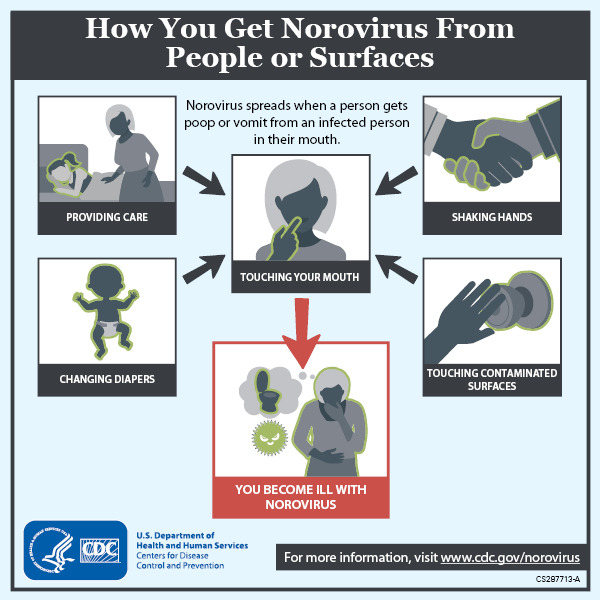Norovirus (or the vomiting bug) is a highly contagious disease characterised by diarrhoea, vomiting, and stomach pain. Symptoms typically develop 12 to 48 hours after being exposed to the virus and usually last one to three days.
Norovirus and influenza are both RNA viruses, which means they replicate by using RNA instead of DNA. This makes them highly mutation-prone and, consequently, difficult for the immune system to defend against, which is why you can catch norovirus year after year.

The History of Norovirus
Since at least 1929, when a paediatrician wrote about “winter vomiting disease”, doctors have known about norovirus. In 1968, a virus was thought to have caused an outbreak at an elementary school in Norwalk, Ohio. This virus was called the “Norwalk virus.” In the 1990s, scientists started to look more closely at the virus’s genes and proteins. They eventually found that Norwalk was one of 150 or more related human viruses, now called “noroviruses”, that all cause similar symptoms. As scientists learned more about norovirus, they began to call it the “perfect pathogen”.
What makes it so spectacular?
People who have the virus make a lot of it, but it may only take 20 virus particles to make someone sick, which isn’t very many compared to other viruses. And that small number of virus particles will be happy to hang out in the environment for weeks or longer, even though they can’t be killed by most of the active ingredients in cleaning products.
Even if a person feels better after a few days, they may still be spreading the virus for many more. Noroviruses are also different, so even if your immune system learns how to fight one, it won’t be able to fight the others. And it doesn’t seem like immunity lasts very long. The only bad thing about the norovirus is that it can’t make more viruses unless it’s inside a person. This means that it can’t make more viruses when it’s on your doorknobs or in your food.
Why Does Norovirus Spread so Easily?
Another danger is that it can be spread even after you feel better, because, like influenza, the virus is still being produced in the body after you return to health. This means that people returning to work as soon as they no longer have the symptoms may infect others as a result. It is therefore recommended that you stay at home for at least two days after you recover.
Norovirus is encased in a capsid protein shell which alcohol cannot penetrate, this is why alcohol-based hand sanitisers do not kill norovirus. It will, however, be killed by bleach, which is why restaurants and bars are required to clean surfaces with bleach. Areas that you suspect are contaminated should be cleaned and disinfected this way too. Clothes and linens that may be contaminated should also be washed thoroughly, and individuals should have their own clean towels rather than sharing them.
Norovirus spreads via the faecal-oral route; hands should therefore be cleaned thoroughly after using the toilet and changing nappies, as well as before handling food. Fruits and vegetables should be washed before preparing and eating them and shellfish should be cooked thoroughly before being eaten. If you do become sick, then you should not prepare food for others for at least two to three days after you recover.
What Should You Do If You Have Any Symptoms
A Recap of The Symptoms
Norovirus makes the stomach or intestines swell up. This is called severe gastroenteritis.
Adults usually start to feel sick 12 to 48 hours after being exposed to norovirus. Most people with norovirus illness get better in 1 to 3 days.
When you have a norovirus illness, you can feel very sick and throw up or have diarrhoea many times a day. Dehydration can happen, especially in young children, older people, and people with other illnesses.
The most common symptoms are:
- Vomiting,
- diarrhoea,
- nausea,
- stomach pain.
Other symptoms include:
- Fever,
- headache,
- body aches.
Dehydration causes a person to urinate less, have a dry mouth and throat, and feel dizzy when they stand up.
When a child is dehydrated, he or she may cry with few or no tears and act unusually sleepy or irritable.
Transmission
Most of the time, Norovirus usually moves from person to person. A virus from someone’s vomit or poop can get on their hands and spread to someone else who touches them. If the virus gets into the air, it could land in someone else’s mouth and make them sick.
Food that is contaminated is a common way for germs to spread, usually because food workers don’t wash their hands well enough. A person with the flu could touch a surface or object, like a doorknob, and spread the virus to the next person who touches it.
Norovirus can also spread through water. This happens more often in developing countries than in developed countries, says Lee-Ann Jaykus, a norovirus researcher at North Carolina State University in Raleigh. Even though there are many strains of norovirus, the GII.4 strain is the one that causes the most outbreaks.
Stomach Flu Vs Norovirus
If you are in doubt if you have norovis, flu or stomach flu, you can check our blog here: https://flucamp.com/blog/what-is-the-difference-between-stomach-flu-vs-flu-virus/
What is The Best Way to Treat Norovirus?
Unfortunately, there is no specific medication that can be used to treat norovirus. Antibiotics will not help the illness, as they do not work on viruses.
Resting and drinking plenty of liquids to replace fluid loss and prevent dehydration is important in recovery, and special rehydration drinks can be taken if you are showing signs of dehydration, like dry mouth or dark urine. Paracetamol can be taken for any fever, aches or pains that you may have, and antidiarrheal and anti-vomiting medication can be taken to tackle the symptoms – though medical advice should sought before taking these.
Fortunately, most people recover from norovirus after a couple of days and can get back to everyday activities shortly after. By following these hygiene tips you can prevent the virus from spreading, keeping you and those around you safe!
 References
References
- https://www.cdc.gov/norovirus/index.html (Accessed March 2023)
- https://www.nhs.uk/conditions/norovirus/ (Accessed March 2023)
- https://knowablemagazine.org/article/health-disease/2017/norovirus-perfect-pathogen#:~:text=Norovirus%20has%20been%20known%20to,virus’s%20genes%20and%20proteins%20in (Accessed March 2023)


